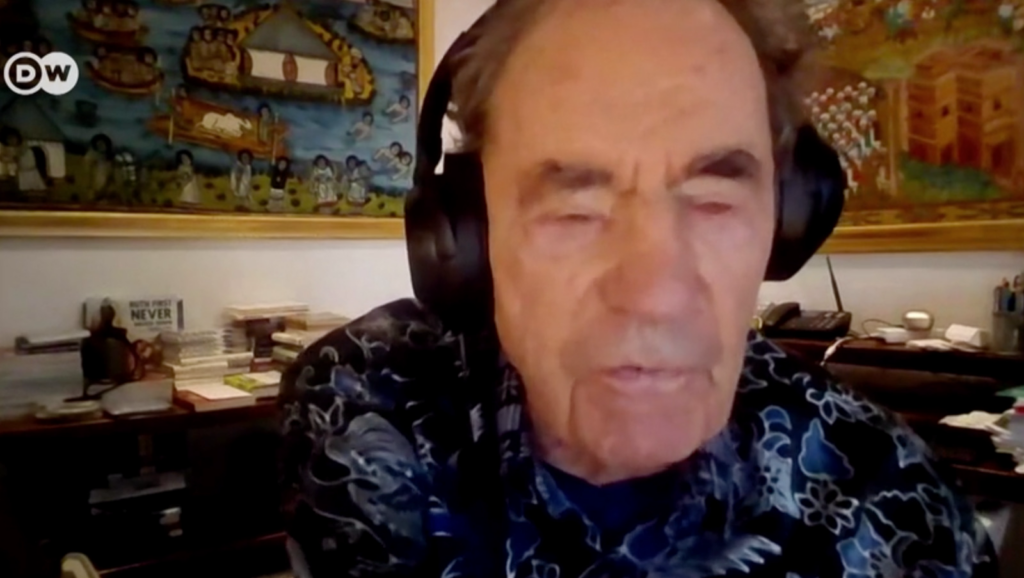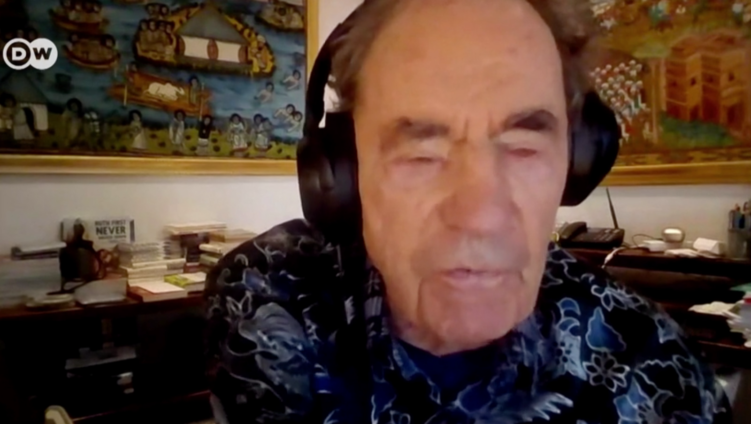From a young age, Albie Sachs played a prominent role in the struggle for justice in South Africa. As a result, he endured solitary confinement, torture by sleep deprivation, and eventually survived a car bomb attack that cost him his right arm and the sight in one eye.
The bomb, reportedly planted by the South African security services, exploded when Sachs unlocked his parked car in Maputo. Sacks lost an arm and an eye. These harrowing experiences fueled an outpouring of creative thought on the role of law as a protector of human dignity in the modern world and sparked a lifelong commitment to establishing a new era of justice in South Africa.
Sachs’ story of struggle and resilience was a highlight of the Global Media Forum in the German city of Bonn. The forum attracted more than 1500 participants from over 100 countries.
Joining the forum via video link, Sachs discussed his eventual discovery of the man who planted the bomb in his car and his decision to shake hands with an individual who nearly killed him.

Soft Vengeance
Sachs’s activism centered on ensuring democracy and the rule of law in South Africa. For him, the only way to avenge the perpetrators of the heinous crime against him was through the successful implementation of democracy in the country.
“It means you accomplish the goals that you set out to accomplish, but you don’t do it by doing to them what they have done to you. Soft vengeance is not simply forgiveness...and the ultimate objective is always about how you can live together,” he said.
Despite his ordeal, Sachs played a pivotal role in drafting South Africa's post-apartheid Constitution and was appointed by Nelson Mandela as a member of the country's first Constitutional Court.
Lessons for Ghana's anti-corruption fighters
Albie Sachs' journey from victim of political violence to architect of democratic principles holds significant lessons for Ghana’s political process, particularly for those fighting against corruption. Ghana, like South Africa, has its own challenges. While South Africa dealt with injustice in the form of apartheid, Ghana is faced with injustice in the shape and form of corruption – a cancerous tumour that has blighted the record of almost every government since independence.
Fighters of corruption are often trolled, vilified and sometimes attacked for fighting for the masses and ensuring that money that will build boreholes and public latrines for the underprivileged does not end up in the pocket of a greedy politician seeking heaven on earth for the five generations after him.
Sachs’ resilience in the face of adversity serves as an inspiring model for Ghana’s anti-corruption activists.
Resilience and determination
Sachs' unwavering commitment to justice, despite severe personal injuries, underscores the importance of resilience and determination in the face of adversity. Ghanaian anti-corruption fighters must similarly remain steadfast in their efforts, regardless of the challenges they encounter. The fight against corruption is arduous and often dangerous, but as Sachs’ story illustrates, perseverance can lead to substantial progress.

Rule of law and human dignity
Sachs’ belief in the rule of law as a protector of human dignity is particularly relevant to Ghana’s anti-corruption efforts. Corruption undermines the rule of law and erodes public trust in institutions. By advocating strong legal frameworks and transparent governance, Ghanaian activists today can help build a society where the rule of law prevails.
Today, various anti-corruption fighters and civil society organisations are speaking up after it emerged Ghana’s
Sachs’ concept of "soft vengeance," achieving justice through peaceful means and reconciliation, offers a powerful message for Ghana. In the fight against corruption, it’s crucial to seek justice without resorting to retribution. Promoting transparency, accountability, and ethical governance can help foster a culture of integrity and reconciliation in Ghana.
Again, Sachs’ work in creating a constitution that aimed to heal a divided society highlights the importance of inclusive institutions. Ghana’s political process can benefit from ensuring broad-based participation in decision-making processes, fostering inclusivity, and addressing the needs of all citizens. By doing so, Ghana can build a robust democratic society that is resistant to corruption.
Albie Sachs' story is a testament to the power of resilience even in the face of profound injustice. Ghana must continue to build a society that reflects the aspirations of all its people, much like Sachs envisioned for South Africa.
Latest Stories
-
4-year-old cured leper walks again after Bawumia sponsored her special surgery
4 hours -
Dorcas Affo-Toffey, earns dual Master’s Degrees in Energy, Sustainable Management, and Business Administration
4 hours -
T-bills auction: Government got GH¢21.5bn in November 2024, lower than target
7 hours -
Ghana to return to single digit inflation in quarter one 2026
8 hours -
Panama’s president calls Trump’s Chinese canal claim ‘nonsense’
8 hours -
Manmohan Singh, Indian ex-PM and architect of economic reform, dies at 92
8 hours -
Government is not been fair to WAEC – Clement Apaak on delay to release WASSCE results
8 hours -
Bayer Leverkusen’s Jeremie Frimpong donates to Osu Children’s Home in Ghana
11 hours -
GPL 2024/25: Heart of Lions beat Young Apostles to go three points clear
12 hours -
Dance battles, musical chairs light up Joy FM Party in the Park
12 hours -
Kwabena Kwabena, Camidoh, Kwan Pa Band, others rock Joy FM Family Party in the Park
12 hours -
GPL 2024/2025: Aduana beat struggling Legon Cities
12 hours -
GPL 2024/25: Bechem United fail to honor match against Holy Stars
12 hours -
Cooking competition takes centrestage at Joy FM Family Party In The Park
13 hours -
Album review: ‘Wonder’ by Nana Fredua-Agyeman Jnr
15 hours

